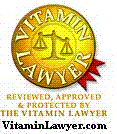"Supporting Industry Compliance with FDA and FTC Regulations."
Page Index:
· Index
· Contact Me
· Top
The Vitamin Lawyer Consultancy
www.vitaminlawyer.com
Ralph Fucetola JD
Nutrient Labeling and Advertising |
|
Nutrient Labeling and Advertising Laws and Regulations Enforced by FDA: http://www.cfsan.fda.gov/~dms/reg-2.html Dietary Supplement Health & Education Act of 1994,
http://vm.cfsan.fda.gov/~dms/dietsupp.html
There are a number of resources available from the Food and Drug Administration (FDA) regarding the labeling and advertising of dietary supplements on the Internet. Among these are the Statement of Identity, Nutrition Labeling, and Ingredient Labeling of Dietary Supplements Small Entity Compliance Guide at http://www.cfsan.fda.gov/~dms/ds-label.html and the Structure/Function Claims Small Entity Compliance Guide at http://www.cfsan.fda.gov/~dms/sclmguid.html. The Federal Trade Commission also has on-line resources available, for example, Dietary Supplements - An Advertising Guide for Industry at http://www.ftc.gov/bcp/conline/pubs/buspubs/dietsupp.htm. "Labeling" is regulated by the FDA under DSHEA. "Advertising" is generally regulated by the FTC under its "truthful and not misleading" substantiation rules. Note that the distinction here is between statements on In November 2001 the FDA responded to a question from a vitamin purveyor regarding the status of advertising and third party links on the Internet. Well, now we have the agencies vying to see which agency can protect free speech the best! So think disclaimers, disclaimers, disclaimers... See, The Right of the Public to the Truth for the Supreme Court's take on these Commercial Speech issues. Thus, an approach to Internet advertising that focuses on third party links and recommendations can allow the public access to the widest array of truthful information about the availability of dietary supplements. Ralph Fucetola, JD Update: 11/11/04 -- Over the past weeks, leading up to a meeting with industry leaders scheduled for 11/15, the FDA has exposed its three-pronged surveillance and quality assurance strategy, to enhance the predictability and consistency of the agency's scientific evaluations of dietary supplements and the safety of product ingredients. FDA’s regulatory strategy consists of guidance documents, regulations and science-based compliance and enforcement mechanisms. "These initiatives refine the direction the agency is taking to regulate dietary supplements," said FDA acting Commissioner Lester Crawford. "We now have a clear roadmap to share with the dietary supplement industry" The FDA's strategy focuses on monitoring and evaluating product and ingredient safety, with special emphasis on (1) new dietary ingredients; (2) ensuring product quality; and (3) surveying and evaluating product labeling.
http://www.fda.gov/OHRMS/DOCKETS/98fr/2004n-0458-bkg0001.pdf. The agency has also issued a draft guidance to assist companies in gathering the scientific information needed to support a labeling claim. The guidance describes the amount, type and quality of evidence needed to substantiate a labeling claim on a dietary supplement, as required under section 403(r)(6) of the Federal Food, Drug and Cosmetic Act. That section requires that dietary supplement labeling claims, including nutritional deficiency, structure/function or general well-being claims, must be truthful and not misleading. To meet this statutory requirement, companies must possess adequate evidence for each reasonable interpretation of the claim. The agency said it would use the FTC standard of "competent and reliable scientific evidence" to substantiate a claim. The draft guidance, titled "Substantiation for Dietary Supplement Claims Made Under Section 403(r)(6) of the Federal Food, Drug and Cosmetic Act," was published in the Nov. 9 Federal Register and can be found at:
http://www.fda.gov/OHRMS/DOCKETS/98fr/2004d-0466-gdl0001.pdf. ã 2002, 2004 v 11/12/04 |
Breaking News!
Vitamin Lawyer News
Updated Often!
|
cGMPs & SoPs are Coming to the Vitamin
Industry! |
Vitamin Lawyer On Line Seminar - FREE!
Ralph Fucetola JD
Email me with questions: |
Look for the Vitamin Lawyer Oversight Seal of Approval on Nutrient Web Sites
|
|
Your web site needs a proper SUS |
|
SUPPORT LIFESPIRIT This site hosted on the net by LifeSpirit Center This site makes no representations regarding these offers. |
© 2007
Powered by
counter.bloke.com
![]()
Web Site Index:
·
Home
Page
·
Credentials
·
Services
·
Payments
·
SOPs
·
SUS
·
Forming a Company
·
Vitamin Lawyer News
·
FDA - FTC Regs
·
Links
·
International Services
·
Nutrient Picks
·
Consumers
·
Personal Importation
·
Professional Seminars
·
FREE
Online Seminar
·
Vaccine Choice
·
Site Use Statement
·
Site Map
·
Top
·
Home
Page
·
Credentials
·
Services
·
Payments
·
Oversight Seal ·
Site Use Statement
·
Top

